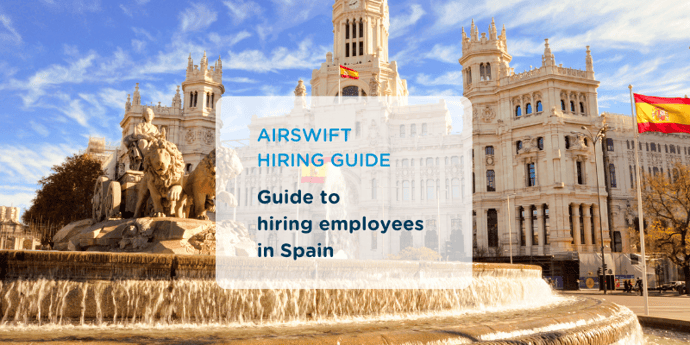
By
Leanna Seah
September 20, 2024
Updated
October 29, 2024

Overview
Spain is a country located in southwestern Europe, occupying most of the Iberian Peninsula. With an employee population of approximately 20 million people, it is one of the largest countries in Europe and home to a highly educated workforce.
Spain's economy is the fifth-largest in the European Union by Gross Domestic Product (GDP), with a total output of $1.4 trillion as of 2021. The country's major industries include textiles, clothing, automotive manufacturing, technology, tourism, and construction. Spain has a high Human Development Index (HDI) of 0.904 (25th in the world) and a literacy rate of over 98%, making it a desirable location for businesses looking to expand their operations.
The country is also known for its vibrant culture, delicious cuisine, and warm climate, making it an attractive destination for foreign workers. With all of these factors in mind, Spain presents a wealth of opportunities for companies looking to hire top talent and grow their businesses.
| Capital |
Madrid |
| Languages spoken |
Spanish |
| Population size |
47.4 million |
| Payroll frequency |
Monthly |
| Currency |
Euro (€) |
| VAT |
General VAT: 21% (appliances, cars, smartphones) |
Payroll and taxes
Spain is a very common country for businesses that are looking for national expansion. A lot of foreign companies move to Spain because of good overall indicators and a stable economy.
Employer contributions
Employer payroll contributions consists of these main different taxes:
- 23.6% - Social Security Fund (minimum monthly 1,125.90 Euro and the maximum is 4,495.00 Euro)
- 5.5% - Unemployment Fund
- 0.2% - Salary Guarantee Fund
- 0.6% - Professional Training
Employee contributions
Employee payroll contributions consists of these main different taxes:
- 4.7% - Social Security Fund
- 1.55% - Unemployment Fund
- 0.1% - Professional Training
All workers are subject to these contributions in Spain. The taxes are straightforward as Social Security, Unemployment Fund and professional training, a contribution to vocational education and training within the country.
Income tax
Workers are subject to income tax in Spain. And the table with the values and the according rates are the following:
.png?width=800&height=400&name=Portugal%20Hiring%20Guide%20(1).png)
Social security contribution
All workers are required to contribute a fixed rate of 4.7% to the social security office in Spain.
Minimum wage
In Spain, minimum wages are established based on industry sectors through collective bargaining agreements. As a general rule, the country's minimum wage is set at 965 EUR per month, which amounts to 32.17 EUR per day.
However, temporary and seasonal employees who work for the same company for less than 120 days must earn a minimum of 45.70 EUR per day. For domestic workers who are paid hourly, the minimum wage is set at 7.55 EUR per hour for the hours worked.
Working hours
In Spain, the maximum duration of the standard working week is 40 hours per week. The typical workday in Spain usually begins at 9:00 am and stops around 2:00 pm, at which point many businesses observe a siesta or break. After the break, operating hours typically resume from 4:00 to 5:00 pm and end around 8:00 pm.
Under the Spanish Workers Statute Royal Decree-Law 8/2019, employees are required to accurately record their daily working hours by "clocking" in and out when taking a break or at the end of the working day.
Overtime
In Spain, if an employee works more than the standard 40-hour workweek, they are entitled to receive compensation for overtime. The maximum number of overtime hours that a single employee can work in a year is 80 additional hours. Regulations regarding overtime hours and payments are established in accordance with collective agreements to ensure fair compensation. The regular and most standard value for overtime is +75% pay for each hour including remote workers.
Employee benefits
13th and 14th-month salary
In Spain, it is mandatory for employees to receive a thirteenth and fourteenth month's salary payment. It is common practice for the annual salary to be split into 14 instalments, which includes the double salary payment. This extra payment is made by the employer in July and December, as stipulated in the employee's employment contract and collective agreements.
 Source: Shutterstock
Source: ShutterstockTypes of leave available
Paid time off
Spanish employment laws state that employees are entitled to 30 calendar days of paid annual leave per year, which amounts to 22 business days. It's worth noting that some collective agreements may offer other specific entitlements to employees.
Sick leave
In Spain, if an employee becomes ill or suffers a personal accident, they are entitled to receive temporary disability benefits for sick pay, which amounts to at least 60% of their regular salary.
For common diseases or non-work-related injuries, the following applies:
- Up to 3 days = 0% (Employers are not obligated to pay, unless otherwise stated in the Collective Bargaining Agreement (CBA) or agreed upon.)
- 4 to 15 days (up to 12 days straight) = 60% (Employers are obligated to pay 60% of the employee contributions base.)
- 16 to 20 days (up to 5 days) = 60% paid by Social Security (Social Security pays 60% of the employee contributions base, even if the employer makes the payment on behalf of the social security.)
- 21 days or more = 75% paid by Social Security (Social Security pays 75% of the employee contributions base, even if the employer makes the payment on behalf of the social security.)
It's important to note that the above is applicable unless the specific CBA states otherwise or there is a different company policy in place.
Maternity leave
A pregnant employee in Spain has the right to take 16 weeks of maternity leave, which is unpaid. If the delivery is complicated or there are multiple births, the leave may be extended to 18 weeks. The maternity leave consists of two periods: a mandatory leave for the first 6 weeks after the birth and additional leave for the remaining 10 weeks of full absence or 20 weeks of half-day absences, which can be taken up to one year later with a 15-day notice.
During maternity leave, the Social Security System Health Insurance Fund manages and pays the maternity pay. The pay is calculated as a monthly benefit equal to 100% of the mother's base rate from the previous month of the leave start.
In Spain, all pregnant women are entitled to healthcare before, during, and after birth. To receive healthcare services, they need to visit the healthcare centre with their Sistema Nacional de Salud (National Health Service) user's card.
Paternity leave
The Spanish Government allows fathers to take up to 16 days of paid paternity leave (or up to 18 weeks for multiple births). In the case of same-sex couples, both parents are entitled to paid leave, but each parent must apply for their respective leave to qualify for paid benefits.
To receive full paternity pay, the father must have paid social security contributions for at least 180 working days in the past 7 years or for a total of 360 days in their professional life. While the government pays 100% of paternity pay, the employer is responsible for certain taxes related to salary payments.
Bereavement, moving, care and other leaves
Spanish labor law states that employees in Spain may be granted additional types of leave, subject to the terms and conditions of their collective agreement and the agreement of their employer. These types of leave include:
- Up to two years of unpaid leave to care for a seriously ill household or family member.
- Two days of leave (or four days if travel is required) to care for a family member with a serious illness or injury.
- Two additional weeks of leave in the case of disability of a child, an adopted child, or a foster care child for employees on maternity leave.
- Two days of paid leave (or four days if travel is required) for the death of a family member.
- One day's leave for an employee who is moving to a new home.
- Up to 15 days of leave for employees in case of marriage
- Paid leave for employees to perform public or personal obligations, such as appearing in court. A written notice is required.
- Additional leave for employees performing trade union or workers' representative activities, as established by law or collective agreement.
Public holidays
There are two types of holidays in Spain. National and regional. Here’s the list of National Holidays in the country:
- New Year’s Day - January 1
- Epiphany - January 6
- Good Friday (Last friday before Easter)
- Easter
- Labor Day - May 1
- Assumption Day - August 15
- Hispanic Day - October 12
- All Saints’ Day - November 1
- Constitution Day - November 6
- Immaculate Conception - December 8
- Christmas Day - December 25
Attracting talent
The Spanish job market is highly competitive, making it crucial for companies to attract and retain top talent. This has led to what is known as the "talent war," where companies must employ various strategies to stand out from the competition. While offering competitive salaries is important, it's not the only way to attract and retain top candidates.
Adding value to jobs is critical for companies to retain the best talent because employees want to feel that their work is meaningful and impactful. Companies that focus solely on compensation and benefits will struggle to attract and retain the best talent, as many employees seek out a sense of purpose and fulfilment from their work.
By adding value to jobs, companies can create a sense of ownership, autonomy, and mastery in their employees, which can lead to greater job satisfaction and engagement.
The role of benefits in recruiting and retaining employees
Just like Portuguese workers, Spanish employees also look for a solid benefits package. Especially when considering the top talent or a very disputed market. With that being said, the best way for businesses to stand out in this situation is offering a competitive benefits package. The new era of benefits impacting way more employees decisions are here to stay.
One of the best ways to stand out is by offering a globally competitive benefits package. Offering an attractive compensation package can be a determining factor in attracting top candidates and retaining the best talent. A comprehensive package may include:
- Meal Vouchers
- Public Transportation Allowances
- Supplementary Insurance and Pension
- Gym Membership
- Cash Bonus (performance or other)
- Learning Tuition
There's life besides work
Achieving work-life balance has become a prominent and sought-after benefit in today's workforce. The concept revolves around finding equilibrium between one's professional and personal life, allowing individuals to dedicate time and effort to both aspects without sacrificing personal or family commitments.
By prioritising work-life balance, organisations can significantly enhance the mental well-being, overall wellness, and productivity of their employees.
In addition to traditional financial incentives such as allowances, vouchers, insurances, and pensions, the modern workforce places a high value on "meaningful benefits" that address their everyday challenges.
Offering flexible working hours, promoting remote work opportunities, and granting ample personal time off are remarkable strategies to attract top-tier candidates and establish your company as an employer of choice.
Crafting a career path is crucial
Having well-designed career paths for employees is crucial for attracting and retaining talent within an organisation. A clear and structured career progression framework provides employees with a sense of direction and purpose, showcasing potential growth opportunities within the company. In this situations, leadership plays a major role in crafting customised career paths for employees. This action is very important when the goal is to retain the top talent that companies already have.
When candidates evaluate potential job opportunities, they are often looking for more than just a job; they seek long-term prospects and professional development. A well-defined career path not only demonstrates that the company values its employees' growth and success but also provides a roadmap for advancement and achievement.
This, in turn, attracts ambitious and driven individuals who are motivated to excel and contribute to the organisation's goals. An Oracle Survey revealed that 83% of workers are willing to make a change in their careers and 20% of them would make a big change because they don’t see a great career path carved for them within their companies.
Moreover, career paths contribute significantly to employee retention. When employees see a future within the company, with defined milestones and the opportunity to acquire new skills and take on challenging roles, they are more likely to remain committed and engaged.
 Source: Shutterstock
Source: ShutterstockTermination of employment
The process of termination differs depending on the specific Employment Agreement and Collective Agreement in effect, and is contingent upon the type of contract and the grounds for termination.
Notice period
In Spain, the standard notice period is typically 15 days. If an employee fails to provide notice, for this period of time, the employer has the option to provide payment in lieu of notice.
Probation period
In Spain, the length of probation or trial periods is typically determined by collective agreements. However, it is common practice for probation periods to be two months in length, and for them to extend to six months for graduate technicians or seniority employees.
Severance
Severance pay is applicable only in cases where the employer terminates an employment agreement without notice. In such cases, the severance pay is equivalent to the amount the employee would have earned if notice had been given.
An employer has the option to either grant notice or pay an indemnity in lieu of notice when terminating an employment contract. It is also possible to combine both options by serving a notice period followed by the payment of an indemnity for the remaining period. The indemnity in lieu of notice is calculated based on the employee's annual salary at the time of termination, including statutory and contractual fringe benefits. If an employer terminates a contract, they must comply with the following legal requirements:
- Provide written notice to the employee stating the reasons for the dismissal.
- Provide compensation of 20 days salary per year of service, payable upon delivery of the written notice, up to a maximum of 12 months' salary.
- Give the employee thirty days' notice of the termination of the contract, to commence from the moment of official notification to the employee.
- If the dismissal is deemed unfair, the employer must pay compensation equivalent to 45 days' pay per year of service (for employment before February 12, 2012) and 33 days after that date, up to a maximum of 42 months' salary.
What are my options for hiring?
Looking to expand your business to Spain? Airswift can offer assistance in complying with local government regulations for employment, legal advice, labour law, taxes, workplace safety, permits, and other related issues.
With our expertise, we can help protect your business from unnecessary risks, allowing you to focus on your company's demands, prospects, and international expansion.
We have extensive knowledge and experience in Spain, enabling us to assist our clients with HR-related matters in a cost-effective and compliant manner.
Talent acquisition
Airswift can provide expert assistance to help your business find and hire top talent in Spain. Our vast industry knowledge and experience allow us to quickly and efficiently locate the best candidates for your organisation.
Whether you need help with short-term project staffing or permanent recruitment, we have solutions that fit your needs.
Our local talent acquisition consultants can work with your company to identify the ideal candidates that align with your company culture. We also have a comprehensive database of highly qualified contractors for flexible employment options. Trust Airswift to help you build a strong and dynamic workforce in Spain.
Employer of record
If your business is interested in hiring Spanish workers but doesn't want to set up a local entity, Airswift can assist you as an Employer of Record (EoR). This means that we can help you find and hire the right people for your company, without the need for a physical office.
By working with a third-party EOR like Airswift, you can focus on running your business while we take care of administrative responsibilities such as payroll, tax management, employee benefits, and onboarding. Our EOR services allow you to comply with local laws and regulations, without the need for a full-time HR department.
*Although the information provided has been produced from sources believed to be reliable, no warranty, express or implied, is made regarding the accuracy, adequacy, completeness, legality or reliability of any information. For the latest information and specific queries regarding particular cases, please contact our team.


